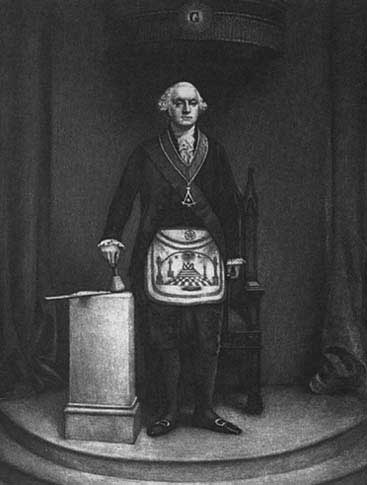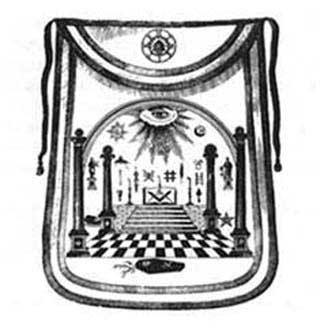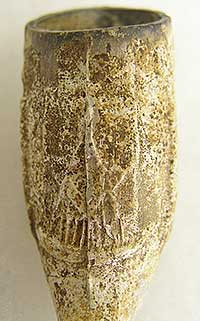Excerpted from: America's Secret Destiny (link below)
Destiny Books
by Robert Hieronimus
George Washington
Mackey's Revised Encyclopedia of Freemasonry (1966) clearly shows that Washington's membership in the order was more than token.
Washington was initiated, in 1752, in the Lodge at Fredericksburg, Virginia, and the records of that Lodge, still in existence, present the following entries on the subject. The first entry is thus: "Nov. 4th. 1752. This evening Mr. George Washington was initiated as an Entered Apprentice," receipt of the entrance fec, amounting to £23s., was acknowledged, F.C. and M.M. March 3 and August 4, 1753. On March 3 in the following year, "Mr. George Washington" is recorded as having been passed a Fellow Craft; and on August 4, same year, 1753, the record of the transactions of the evening states that
Figure 4:
White satin Masonic apron emhroidered with Masonic emblems bv Marquise Lafayette. Gift from General Lafayettc to Georgc Washingron, 1784. (Holy Bible, Red Letter Edition, Masonic Edition, 1960. )
General Lafayette and General Washington shared not only a close friendship but membership in the Craft, a commonly used name for Freemasonry. On two occasions General Lafayette presented Masonic aprons to Washington (see Figure 4). One of these aprons, embroidered in colored silks by Madame Lafayette, bore the emblems of the Holy Royal Arch degree. The fact that this apron was especially made for Georgc Washington has led to much speculation that he was raised to that degree. This may be of considerable importance, for the "Royal Arch degree is the salient, spiritual degree of Freemasonry, not excepting the degree of Master Mason" (Steinmetz, 1946, 67).
While he was commander in chief of the American armies during the Revolutionary War, Washington frequently attended the meetings of military lodges. He presided over Masonic ceremonies initiating his officers and frequently attended the Communications of the Brethren (lodge meetings). Washington was nominated for Grand Mastership of the Independent Grand Lodge, an office he declined. In 1805, this lodge was renamed Alexandria Washington in his honor. To Masonic authorities, the evidence is clear that Washington was the master of a lodge. Testimony given by Timothy Bigelow in a eulogy before the Grand Lodge of Massachusetts two months after Washington's death indicates that Washington's Masonic experience was more than perfunctory.
The information received from our Brethren who had the happiness to be members of the Lodge over which he presided for many years, and of which he died the Master, furnishes abundant proof of his persevering zeal for the prosperity of the institution. Constant and punctual in his attendance, scrupulous in his observance of the regulations of the Lodge, and solicitous, at all times, to communicate light and instruction, he discharged the duties of the Chair with uncommon dignity and intelligence in all the mysteries of our art.
In his letters and addresses to Masonic bodies, Washington repeated his profound esteem for their principles. In 1797, he addressed the Grand Lodge of Massachusetts: "My attachment to the Society of which we are all members will dispose me always to contribute my best endeavors to promote the honor and prosperity of the Craft" (Sachse, 1915). Later in the same speech he said that the Masonic institution was one whose liberal principles are founded on the immutable laws of truth and justice and whose grand object is to promote the happiness of the human race. Only thirteen months before his death he declared to the Grand Lodge of Maryland, "So far as I am acquainted with the doctrines and principles of Freemasonry, I conceive them to be founded in benevolence, and to be exercised only for the good of mankind. I cannot, therefore, upon this ground, withdraw my approbation from it" (Mackey, 1966, 1095).
Historians have offered many reasons for the fact that a rag-tag American army, led by a general who had to go to the library to brush up on battle tactics, could defeat the strongest military power in the world. Many valid factors have been cited—the barrier of the Atlantic Ocean, the weakness of King George and his problems at home, the guerrilla tactics of the American army, etc.—but what has been overlooked is the influence of secret societies, especially Freemasonry, on America's leaders. Some esoteric historians (Hall, 1951; Case, 1935) cite that of the 56 signers of the Declaration of Independence, at least 50 were Freemasons. Whether this is a fact or not cannot be presently corroborated, but substantial information supports that many of the offcers and enlisted men in the American military were Freemasons and many practiced the craft in the miliury lodges. According to General Lafayette (a Freemason himself), Washington "never willingly gave independent command to officers who were not Freemasons. Nearly all the members of his official family, as well as most other officers who shared his inmost confidence, were his brethren of the mystic tie" (Morse, 1924, ix).
Freemasonry allowed Washington greater control of and influence on his army. Those who breached military and Masonic secrets faced the penalty of death. Manly Hall (1951) and Paul F. Case (1935) report that 12 of Washington's generals were Freemasons, and that this, in part, accounted for their strong allegiance during America's darkest hours.
The underlying philosophy of Freemasonry ("The brotherhood of man and the Fatherhood of God") was the foundation of political, religious, social, and educational reform, which was opposed by the monarchies of Europe and ecclesiastical authorities as well. Washington's leadership and involvement with the craft gave him the confidence that America's military secrets were safe. His involvement in Freemasonry, as Master of the Lodge, provided him with more than confidence, because the lodge ritual's function was to elevate the participant's consciousness.
A group of Freemasons experiencing the rituals and initiations in an altered state of awareness provided the internal strength and fortitude for them to grasp the importance of the American revolutionary experience, and its meaning for humanity as a whole. Thus the Atlantic Ocean, guerrilla tactics, and King George's conflicts contributed to the defeat of the English army, but so did the Freemasonic experience. It provided Washington the will and capacity to defeat King George when the world expected America's defeat.
Washington's reputed involvement in the American Rosicrucian Supreme Council is documented in an account entitled, "The Fulfilment of the Prophecy, The Consecration of Washington, The Deliverer, The Wissahickon." The Wissahickon, a creek in Philadelphia, has a special meaning for Rosicrucians.
Wissahickon is much more than a word, or the name of a stream, however beautiful. To the true American it is synonymous with a pure Mystic religion, with the freedom of all religious sects, for it was here that the many sectarians established themselves; with the founding of the American Republic, because here was conceived the constitution, and here was held the first American Rosicrucian Supreme Council, here was Washington, one of its Acolytes consecrated, and here formed the Grand Temple of the Rosy Cross. Wissahickon the beautiful and to many of us, sacred as the Ganges is to the Hindu. (Clymer and Ricchio, 1972,
Our Story of Atlantis, or the Three Steps, describes the part the mystics of the Wissahickon played in founding America. There can be no doubt that Washington was familiar with and admired several of these mystics and occultists (such as Peter Miller who translated the Declaration of Independence into European languages, and Conrad Beissel), for it was Miller who convinced General Washington not to hang one of America's first traitors but to release him to Miller's custody. Familiarity with Washington's policies toward traitors to the American cause allows one appreciation of the magnitude of Washington's favor. It seems clear that Washington respected Miller and the mystics of the Wissahickon, but the nature of the friendship remains a mystery.
Washington's views on the Illuminati, however, are very clear. He condemned them as "self- created societies" and dealt them a blow that led to their disappearance. When questioned about whether or not Illuminism had spread to Masonry in America, Washington answered that he "did not believe that the lodges of Freemasons in this country had as societies, endeavored to propagate the diabolical tenet of the former [Illuminati] or pernicious principles of the latter Jacobinism]" (Sparks, 1848, 11: 577).
George Washington's metaphysical leanings are fairly well known; the depth of his spirituality is less so. During the Valley Forge episode his inner strength was perhaps the deciding factor in his ability to hold together what was left of his army (whom he sometimes referred to as his "Christian soldiers"). Washington spent a long time each day in prayer and meditation. This habit of his is well known, and etchings of Washington on his knees beneath the trees of Valley Forge are common. He carried his daily practice of prayer into the lives of his soldiers, ordering prayers to be said in the army every morning, and on Sunday when no chaplain was available he read the Bible to his men and led the prayers himself (Heline, 1949)
Washington's speeches and correspondence held many indications of his spiritual nature. Writing to Governor Trumbull of Connecticut, Washington confesses that he could "almost trace the finger of Divine Providence" through those dark and mysterious days which led the colonists to assemble in convention, thereby laying the foundation for prosperity, when he had "too much reason to fear that misery and confusion were coming too rapidly upon us."
Esoteric tradition recognizes two prophecies related to Washington. One is a possible vision he had at Valley Forge, during which an "angel" showed him America's future. Another account is an alleged Indian prophecy given to Washington by an old chief in 1770. The old sachem reportedly believed that the Great Spirit protected and guided Washington's footsteps through the trials of life, and that Washington would become the chief of many nations of a people yet unborn, hailed as the founder of a mighty empire (Lawrence, 1931).
The astrological chart of George Washington computed for February 22, 1732, 10:15 a.m., also supports Washington's spiritual inclinations and a direct access to his subconscious and unconscious minds, making him prone to unexpected vision and expanded consciousness. At Washington's birth the sun was in the sign of Pisces, which predisposes natives to an intuitive, mystical, religious orientation. These abilities were tempered and structured by his lunar placement in the sign of Capricorn, the sign of structured hierarchical form, which gave Washington organizational stability. The ability to take abstract ideas and structure them into a philosophical system of life is shown by the moon in the ninth house, the house of higher mind and philosophy.
An additional grounding influence is present in Washington's rising sign of Taurus. With Taurus as an ascendant, the president's demeanor would have been slow, thorough, and patient. Yet another force drawing his mystical ideas into form is the moon trining the ascendant.
A mystic is one who has intuitions or intimations of the existence of inner and spiritual worlds, and who attempts to come into self-conscious communion with them. An occultist studies the hidden aspects of being, the science of life or universal nature. It is one who studies the structure and operations as well as the origin and destiny of the cosmos. Mysticism is a product of the heart, while occultism is primarily a product of the mind.
The metaphysical leanings of George Washington were decidedly mystical rather than mental or occult; Washington was heart-centered rather than mind-centered. Benjamin Franklin's metaphysical tendencies, in contrast, were mental and practical.
Editor's note from Reverse Spins: It is this editor's belief that the Illuminati did finally penetrate the Freemasons in America but not until the latter half of the 19th century. So any talk of George Washington and the Founding Fathers being a part of a conspiracy or a One World Order is superfluous. Christian fundamentalism does not understand the sacred symbols used by the masons and the founding fathers. (e.g. the third eye, the pyramid, etc.)
Here is a Christian link with speeches and correspondence from George Washington whenever a masonic connection is made. George Washington was wary of fundamentalists as I am. The greatest enemy of religion and freedom is not the devil nor somebody else's religion. It is fanaticism. George Washington knew this. It was why he was guarded in his speech and letters. Modern day fundamentalist are no different. Even though this link is biased, God bless him for making the information available.
George Washington's Correspndence
Washington On Masonry
"Flattering as it may be to the human mind, and truly honorable as it is to receive from our fellow citizens testimonies of approbation for exertions to promote the public welfare, it is not less pleasing to know that the milder virtues of the heart are highly respected by a Society whose liberal principles must be founded in the immutable laws of truth and justice. To enlarge the sphere of social happiness is worthy of the benevolent design of a Masonic institution; and it is most fervently to be wished that the conduct of every member of the Fraternity, as well as those publications that discover the principles which actuate them, may tend to convince mankind that the great object of Masonry is to promote the happiness of the human race." George Washington
ARCHAEOLOGISTS DISCOVER HISTORICAL GEM AT GEORGE WASHINGTON’S FARM-7/4/08
Excavations at Washington’s Boyhood Home Uncover Vital Piece of Presidential History ... Found in one of the cellars, the pipe bears a clear Masonic crest; Washington joined the Fredericksburg Lodge of the Masons in 1753. ...
Click on the picture to buy the book at Amazon.com for $10.47:
Excerpt is from the chapter: "The Founding Fathers and Secret Societies"
Chapter Titles:
1. The Amerindian Influence on the Founder's Vision
2. The Founding Fathers and Secret Societies
3. The History of America's Great Seal
4. The New Age and the Great Seal
5. A Symbolic Analysis of the Seal's Reverse
6. The American Vision and Its Fulfillment
More on: The Legend of the Wissahikon
More on Washington's Masonic and Rosicrucian Connection: The Mysterious Rosicrucian Who was the Father of the American Republic
The Lost Symbol's Missing Mysteries, Part II: Masons and Masters




 America's Secret Destiny
America's Secret Destiny